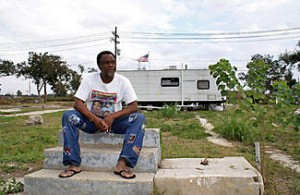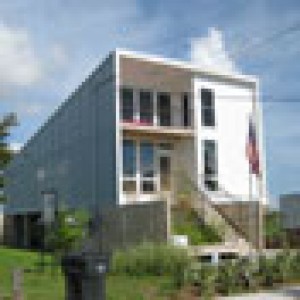After BP (and Katrina): Rethinking the Economy of the Gulf Coast
I met Robert Green, a resident of New Orleans’s Lower Ninth Ward, this June. He lives just blocks from a levee where, on August 29th, 2005, a barge flowed through the break and came to a halt just behind his home. His mother and his 5-year-old granddaughter died in that flood.
I sometimes lead groups of Jewish volunteers to perform community service in neighborhoods still recovering from Hurricane Katrina. That’s how I met Mr. Green. When my group was visiting his block, he came out to talk with us and noticed my kippah. He told us how pleased he was to see a Jewish group and about how a Solomon Schechter class from New Jersey had cleared out the debris on his property and prepared it to be rebuilt.
In front of his house, near where we were standing, was a memorial marker and flagpole honoring the women his family lost during Katrina. We had noticed stones at the base of the marker, just like you would see at a Jewish cemetery. He told us that the Schechter kids had explained the Jewish tradition of placing stones to honor the dead and asked if they might honor his family in this way. A new tradition was born in the community, and we too placed stones on Mr. Green’s memorial.
What Mr. Green really wanted to talk about, however, was his new house, built on his old property with help from the Make It Right Foundation. He brought us inside, to show us the ways in which his house was built for a sustainable future: elevated above the flood line, it features solar water heating, low-wattage lighting systems, and temperature-regulating windows.
#
Mr. Green’s passionate interest in sustainability might at first seemed out of place in a neighborhood in which many homes remain unbuilt, and many families are still unhoused. As we listened to Robert Green talk about his community, however, his passion for sustainability brought home to us what many Americans recently learned as a result of the BP oil spill – the damage that 100 years of short sighted business decisions have had on the Louisiana bayous.
The decisions made by our nation decades ago to foster oil and shipping industries are all too tragically coming back to haunt us and pull our economy down now. A country hungry for the fuel to drive our economic growth in the past century allowed drilling, first in the bayous – cutting through these wetlands to pipe oil out – and then off the coast on the deep horizon of the continental shelf. A nation eager to export the grains of the Great Plains sent the Army Corps of Engineers to dredge canals from New Orleans to the sea, most infamously the Mississippi River Gulf Outlet , to shorten the route to open water and cut hours off the journey to market.
The drilling and dredging came at a cost. Every year Louisiana loses bayous the size of Manhattan because the flow of silt from the inland river is cut off from the bayous by the canals, and because the same canals provide a direct passage for salt water washing in from the sea. The result of this human-made environmental destruction is the loss of the buffer that protects New Orleans from both natural and man-made disasters that come from the sea.
In 2010, the BP oil spill ironically caused the states along the Gulf Coast to build artificial buffers on outer islands diminished in size by ship channels in a desperate attempt to protect inter-coastal fisheries from the oil bleeding out of the earth. In 2005, the damage from these same ship canals was even more terrible. Not only had these canals weakened New Orleans’ bayous, during the hurricane they actually acted as funnels, rushing flood waters into the city and up against the poorly maintained levees.
Folks in Louisiana are realizing that energy today is not a good trade-off for disaster tomorrow. The tourism industry is struggling in a summer without beaches. Oystermen and shrimpers who had just barely gotten their businesses running after Katrina have been idled for months, struggling to get minimal payments from BP while still having to pay off debts they took to hold on to a way of life.
#
The joint Katrina and BP disasters lead to just one conclusion: a damaged environment is not worth the price. Robert Green, living in the middle of the Ninth Ward, knows this first-hand: “All of us, including you, have to use less energy, to have homes that are like mine now … because we know what the damaged environment means to this community.” That means a national approach to fostering a sustainable economy; one that preserves and restores the ruined bayou just blocks from his home, that creates good jobs in a region where he and his family have lived for centuries, and that rebuilds one of our most culturally rich communities better than it was before Katrina and BP.
And so, after five years of dedicated efforts to restore the Gulf Coast following Katrina, what can our community do now?
We can invest in the Gulf Coast to build a new economy. We can realize Maimonides’ eight and highest level of tzedakah – to move people to economic self-sufficiency – through nonprofit and low-interest financing that can bring new capital to these communities and support small business entrepreneurship. We can help community financial institutions like credit unions and their members to weather this perfect storm by providing capital to extend the terms of small business loan and thus not break the backs of those who are in a precarious moment. Through micro-investing like JFSJ’s 8th Degree fund we can help BP-impacted workers develop new business opportunities, giving them choices beyond the company town.
We can advocate for new federal policies that encourage green job creation and a sustainable economy nationwide, to take some of the environmental pressure off this region.
We can build upon the interfaith collaborations that we created after Katrina such as the Isaiah Funds – through which we have moved millions in lending capital into New Orleans – to now provide financial support, in grants and loans, to help the Gulf Coast become a national leader in the green economy; creating jobs building solar panels and wind turbines rather than drilling platforms, putting people to work retrofitting homes and houses of worship as a showcase of what is possible when we set our minds to it.
We can provide financial support, as we have these past years through partnerships across race and faith lines such as the Gulf Coast Fellowship for Community Transformation, to ensure that local communities and grassroots leaders have a voice in the future of their region. We can continue to cultivate the social infrastructure that began to emerge more strongly after Katrina and to say – as a values choice – that the Vietnamese shrimpers, the homecare workers, the neighborhood matriarchs in these communities ought to be able to determine their own future and not be left at the hands of decisions being made in Baton Rouge, Washington, and London (where BP is based).
And we can volunteer. In the years after Katrina, through Jewish Funds for Justice and our partners, the Jewish community sent thousands of volunteers to help cleanup and rebuild. After BP the cleanup needs trained hazmat specialists, and the governors rightly want all the work to be paid for by BP and to provide jobs to the locals put out of work by this crisis. But there is still so much for us to do. There is still housing to be built. There are still families trying to come home after five years. This summer, we helped build a community garden and education center, because there is still much work that these communities want to do, changing minds and behaviors, if they are to succeed in their recovery.
We can and we should do all this because when you listen to Robert Green talk about BP, what you hear is a resilient and hopeful voice. Resilient because even with the loss of his precious loved ones on that day five years ago, he has come back as have so many others. And because, he says, “we are strong enough to survive this, too.”
And hopeful because he saw how people across the nation, Jews and others, stood with him and his people in these difficult years. We came and came again. He heard the message that “you were here for us” because we demonstrated through our work that we saw their struggle as ours. That we recognized that all of us are part of one national journey, that we have common cause and a common destiny. He mentions his optimism that we will continue to stand with his community through this, too, because, “seeing you here gives me hope.”
In the wake of BP, our job remains the same: to fulfill that belief and once again stand with others for our common good, through our acts of chesed (kindness) and tzedakah (philanthropic justice). We as a nation can redeem ourselves of our own past sins against this region; the environmental degradation, the economic choices that have led us to this place. And we as Jews can, as we have so many times before, demonstrate our core belief: that we are all connected and that we are all responsible for building a better America for all our children.
![[the current issue of ZEEK]](../../image/2/100/0/5/uploads/leftistethicistgraphic-52842c6a.png)
- 5000 Pages of Zeek
- Founded in 2001, Zeek was the first Jewish online magazine, and we have over 5000 pages online to prove it, all available free of charge. Read more in the Archive.
More articles in



